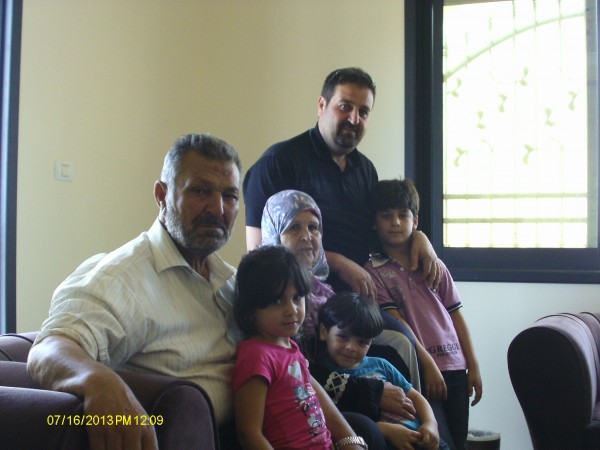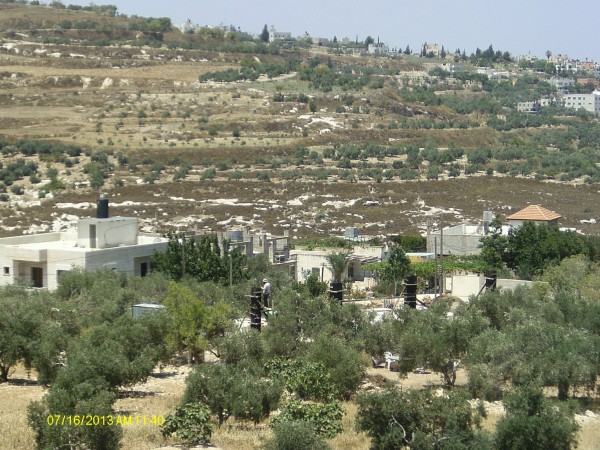“Settling” constitutes a warcime according to international law and ICC statute. Even under US’ own military legislations’
Law resources below this article

Demolition order papers (Photo by ISM – Click to enlarge)
19th June 2013 | International Solidarity Movement, Nablus Team | Sarra, Occupied Palestine
Follow @IsmPalestine
On Monday 10th June Israeli occupation forces in jeeps visited six homes in Sarra and left demolition orders that affect the lives of around fifty people all with young children. The homes have been declared ‘illegal’ under Israeli planning law, claiming that they are within Area C which is under full Israeli civil control. They were all given planning permission by the Palestinian Authority (PA) who are allowed to issue permits under the occupation as part of the Oslo Accords from joint administration in land labeled as Area B.
Sarra a village in the Nablus area with a population of around 4000 falls under the territory of area B. The village is surrounded on three sides by land of Area C and on one side reaching back to Nablus it joins with Area A. As the village expands, there becomes a lack of space for new homes and planning permission is very rarely granted in Area C.
The threat of demolition is due to the Israeli belief that the homes fall under the boundary of Area C, but the families involved believed the land to be in Area B and paid costs and were granted permission from the PA. One home owner affected, Mustafa Durabi said ‘If I had known it was Area C I would not have built here. I have other land but here is nice and quiet that is why I build here.’
Although the homes are very close to the border with Area C, some other homes are closer or just as close, but have not been issued with demolition orders. The homes facing demolition house new families, new couples with children at the start of their lives together. The families have invested all their money into the homes, to which a council member from the village says ‘It’s like their dreams are going to be demolished too.’
The families are in deep shock and are challenging the ‘decision’ in court on the 9th of July at Bet El settlement. The village think that the recent demolition orders are in response to plans to resist against an approved construction of an electrical transformer station in the land of Area B of the village.
Durabi family (Photo by ISM)
Homes threatened with demolition (Photo by ISM)
![]()
LAW
“States may not deport or transfer parts of their own civilian population into a territory they occupy.”
Summary
State practice establishes this rule as a norm of customary international law applicable in international armed conflicts.
International armed conflicts
The prohibition on deporting or transferring parts of a State’s own civilian population into the territory it occupies is set forth in the Fourth Geneva Convention.[1]
It is a grave breach of Additional Protocol I.[2]
Under the Statute of the International Criminal Court, “the transfer, directly or indirectly, by the Occupying Power of parts of its own civilian population into the territory it occupies” constitutes a war crime in international armed conflicts.[3]
Many military manuals prohibit the deportation or transfer by a party to the conflict of parts of its civilian population into the territory it occupies.[4]
This rule is included in the legislation of numerous States.[5]
Official statements and reported practice also support the prohibition on transferring one’s own civilian population into occupied territory.[6]
Attempts to alter the demographic composition of an occupied territory have been condemned by the UN Security Council.[7]
In 1992, it called for the cessation of attempts to change the ethnic composition of the population, anywhere in the former Yugoslavia.[8]
Similarly, the UN General Assembly and UN Commission on Human Rights have condemned settlement practices.[9]
According to the final report of the UN Special Rapporteur on the Human Rights Dimensions of Population Transfer, including the Implantation of Settlers and Settlements, “the implantation of settlers” is unlawful and engages State responsibility and the criminal responsibility of individuals.[10]
In 1981, the 24th International Conference of the Red Cross reaffirmed that “settlements in occupied territory are incompatible with article 27 and 49 of the Fourth Geneva Convention”.[11]
In the Case of the Major War Criminals in 1946, the International Military Tribunal at Nuremberg found two of the accused guilty of attempting the “Germanization” of occupied territories.[12]
References
[1] Fourth Geneva Convention, Article 49, sixth paragraph (cited in Vol. II, Ch. 38, § 334).
[2] Additional Protocol I, Article 85(4)(a) (adopted by consensus) (ibid., § 335).
[3] ICC Statute, Article 8(2)(b)(viii) (ibid., § 336).
[4] See, e.g., the military manuals of Argentina (ibid., §§ 346–347), Australia (ibid., § 348), Canada (ibid., § 349), Croatia (ibid., § 350), Hungary (ibid., § 351), Italy (ibid., § 352), Netherlands (ibid., § 353), New Zealand (ibid., § 354), Spain (ibid., § 355), Sweden (ibid., § 357), Switzerland (ibid., § 357), United Kingdom (ibid., § 358) and United States (ibid., § 359).
[5] See, e.g., the legislation of Armenia (ibid., § 361), Australia (ibid., §§ 362–363), Azerbaijan (ibid., §§ 364–365), Bangladesh (ibid., § 366), Belarus (ibid., § 367), Belgium (ibid., § 368), Bosnia and Herzegovina (ibid., § 369), Canada (ibid., §§ 371–372), Congo (ibid., § 373), Cook Islands (ibid., § 374), Croatia (ibid., § 375), Cyprus (ibid., § 376), Czech Republic (ibid., § 377), Germany (ibid., § 379), Georgia (ibid., § 380), Ireland (ibid., § 381), Mali (ibid., § 384), Republic of Moldova (ibid., § 385), Netherlands (ibid., § 386), New Zealand (ibid., §§ 387–388), Niger (ibid., § 390), Norway (ibid., § 391), Slovakia (ibid., § 392), Slovenia (ibid., § 393), Spain (ibid., § 394), Tajikistan (ibid., § 395), United Kingdom (ibid., §§ 397–398), Yugoslavia (ibid., § 399) and Zimbabwe (ibid., § 400); see also the draft legislation of Argentina (ibid., § 360), Burundi (ibid., § 370), Jordan (ibid., § 382), Lebanon (ibid., § 383) and Trinidad and Tobago (ibid., § 396).
[6] See, e.g., the statements of Kuwait (ibid., § 405) and United States (ibid., §§ 406–407) and the reported practice of Egypt (ibid., § 402) and France (ibid., § 403).
[7] See, e.g., UN Security Council, Res. 446 , 452 and 476 (ibid., § 408), Res. 465 (ibid., § 409) and Res. 677 (ibid., § 410).
[8] UN Security Council, Res. 752 (ibid., § 411).
[9] See, e.g., UN General Assembly, Res. 36/147 C, 37/88 C, 38/79 D, 39/95 D and 40/161 D (ibid., § 412) and Res. 54/78 (ibid., § 405); UN Commission on Human Rights, Res. 2001/7 (ibid., § 413).
[10] UN Sub-Commission on Human Rights, Final report of the Special Rapporteur on the Human Rights Dimensions of Population Transfer, including the Implantation of Settlers and Settlements (ibid., § 415).
[11] 24th International Conference of the Red Cross, Res. III (ibid., § 419).
[12] International Military Tribunal at Nuremberg, Case of the Major War Criminals, Judgement (ibid., § 421).
Source Article from http://occupiedpalestine.wordpress.com/2013/06/19/six-homes-in-sarra-threatened-with-demolition-orders/
Views: 0
 RSS Feed
RSS Feed

















 June 19th, 2013
June 19th, 2013  FAKE NEWS for the Zionist agenda
FAKE NEWS for the Zionist agenda 

 Still live in fairy-tale-land about Israel? Time to wake up: The Map of the “Greater Israel” even is hammered on the currency:All facts at Storify continuously updated. Read what Israeli ‘leaders’ have said and done even before (peace) talks and how their actions contradict the reality and ugly facts which they try to hide from you:
Still live in fairy-tale-land about Israel? Time to wake up: The Map of the “Greater Israel” even is hammered on the currency:All facts at Storify continuously updated. Read what Israeli ‘leaders’ have said and done even before (peace) talks and how their actions contradict the reality and ugly facts which they try to hide from you: Posted in
Posted in 
















